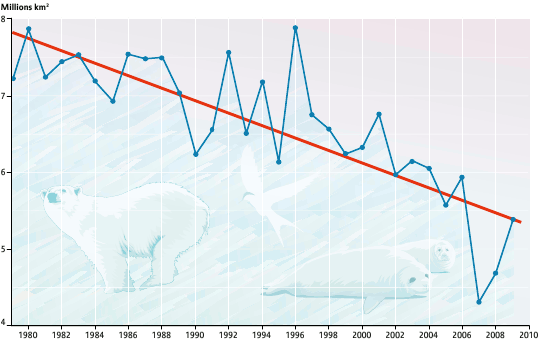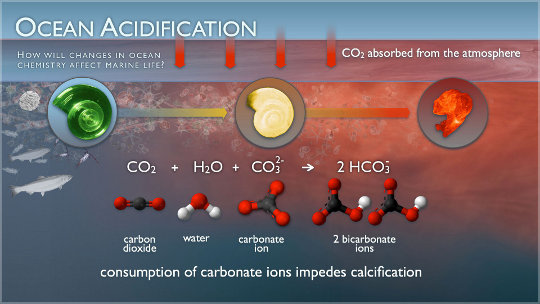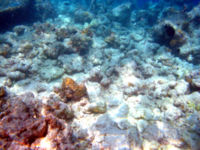Local weather Change Impacts Biodiversity — International Points
[ad_1]
The hyperlink between local weather change and biodiversity has lengthy been established. Though all through Earth’s historical past the local weather has at all times modified with ecosystems and species coming and going, speedy local weather change impacts ecosystems and species means to adapt and so biodiversity loss will increase.
From a human perspective, the speedy local weather change and accelerating biodiversity loss dangers human safety (e.g. a serious change within the meals chain upon which we rely, water sources might change, recede or disappear, medicines and different assets we depend on could also be more durable to acquire because the crops and forna they’re derived from might cut back or disappear, and so forth.).
The UN’s International Biodiversity Outlook 3, in Might 2010, summarized some issues that local weather change can have on ecosystems:
Local weather change is already having an affect on biodiversity, and is projected to grow to be a progressively extra important menace within the coming a long time. Lack of Arctic sea ice threatens biodiversity throughout a whole biome and past. The associated strain of ocean acidification, ensuing from larger concentrations of carbon dioxide within the ambiance, can be already being noticed.
Ecosystems are already exhibiting adverse impacts underneath present ranges of local weather change … which is modest in comparison with future projected adjustments…. Along with warming temperatures, extra frequent excessive climate occasions and altering patterns of rainfall and drought will be anticipated to have important impacts on biodiversity.
Some species might profit from local weather change (together with, from a human perspective, an will increase in ailments and pests) however the speedy nature of the change suggests that almost all species is not going to discover it as useful as most won’t be able to adapt.
On this web page:
Local weather change impacts on biodiversity within the Arctic
The Arctic, Antarctic and excessive latitudes have had the best charges of warming, and this pattern is projected to proceed, because the above-mentioned International Biodiversity Outlook 3 notes (p. 56).
Within the Arctic, it isn’t only a discount within the extent of sea ice, however its thickness and age. Much less ice means much less reflective floor that means extra speedy melting. The speedy discount exceeds even scientific forecasts and is mentioned additional on this website’s local weather change introduction.

When it comes to biodiversity, the prospect of ice-free summers within the Arctic Ocean implies the lack of a whole biome
, the International Biodiversity Outlook notes (p. 57).
As well as, Entire species assemblages are tailored to life on prime of or underneath ice — from the algae that develop on the underside of multi-year ice, forming as much as 25% of the Arctic Ocean’s main manufacturing, to the invertebrates, birds, fish and marine mammals additional up the meals chain.
The long-lasting polar bear on the prime of that meals chain is subsequently not the one species in danger despite the fact that it might get extra media consideration.
Notice, the ice within the Arctic does thaw and refreeze every year, however it’s that sample which has modified lots in recent times as proven by this graph:

Additionally it is essential to notice that lack of sea ice has implications on biodiversity past the Arctic, because the International Biodiversity Outlook report additionally summarizes:
- Vivid white ice displays daylight.
- When it’s changed by darker water, the ocean and the air warmth a lot sooner, a suggestions that accelerates ice soften and heating of floor air inland, with resultant lack of tundra.
- Much less sea ice results in adjustments in seawater temperature and salinity, resulting in adjustments in main productiveness and species composition of plankton and fish, in addition to large-scale adjustments in ocean circulation, affecting biodiversity effectively past the Arctic.
(This website’s intro to local weather change and Arctic geopolitics has extra concerning the affect to the Arctic.)
Growing ocean acidification

Though it has gained much less mainstream media consideration, the results of accelerating greenhouse emissions — particularly carbon dioxide — on the oceans could be important.
Scientists have discovered that oceans are in a position to take up a number of the extra CO2 launched by human exercise. This has helped hold the planet cooler than it in any other case might have been had these gases remained within the ambiance.
Nonetheless, the extra extra CO2 being absorbed can be ensuing within the acidification of the oceans: When CO2 reacts with water it produces a weak acid referred to as carbonic acid, altering the ocean water chemistry. Because the International Biodiversity Outlook report explains, the water is a few 30% extra acidic than pre-industrial occasions, depleting carbonate ions — the constructing blocks for a lot of marine organisms.
As well as, concentrations of carbonate ions are actually decrease than at any time over the last 800,000 years. The impacts on ocean organic range and ecosystem functioning will doubtless be extreme, although the exact timing and distribution of those impacts are unsure.
(See p. 58 of the report.)
Though thousands and thousands of years in the past CO2 ranges have been larger, as we speak’s change is happening quickly, giving many marine organisms too little time to adapt. Some marine creatures are rising thinner shells or skeletons, for instance. A few of these creatures play an important position within the meals chain, and in ecosystem biodiversity.
Some species might profit from the additional carbon dioxide, and some years in the past scientists and organizations, such because the European Venture on OCean Acidification, fashioned to attempt to perceive and assess the impacts additional.
One instance of current findings is a tiny sand grain-sized plankton answerable for the sequestration of 25–50% of the carbon the oceans take up is affected by rising ocean acidification. This tiny plankton performs a serious position in protecting atmospheric carbon dioxide (CO2) concentrations at a lot decrease ranges than they might be in any other case so massive results on them could possibly be fairly severe.
Different associated issues reported by the Inter Press Service embody extra oceanic lifeless zones (areas the place there’s too little oxygen within the sea to assist life) and the decline of essential coastal crops and forests, similar to mangrove forests that play an essential position in carbon absorption. That is on prime of the already declining ocean biodiversity that has been occurring for just a few a long time, now.
There’s additionally a linkage with local weather change:
Ocean stratification, the place heat water sits firmly on prime of chilly, nutrient-rich water, additionally creates lifeless zones and lowers the general productiveness of the oceans.… Such lifeless zones have been uncommon 40 years in the past however now quantity a number of hundred. With out pressing motion, local weather change will proceed to heat oceans, rising stratification and producing bigger and extra lifeless zones with a serious affect on future fisheries, a 2009 research in Nature Geoscience warned.
It is going to take a thousand years for the oceans to chill down, so it’s crucial to drag the emergency brake on world warming emissions, the research concluded.
Coral reefs threatened by local weather change
Around the globe, coral reefs have been dying largely because of local weather change.


Wholesome coral may be very colourful and wealthy with marine life.
At first of September, 2009, the Australian company taking care of the Nice Barrier Reef launched an outlook report warning the Nice Barrier Reef is in hassle.
However it isn’t simply the Nice Barrier Reef in danger. All of them are in danger, says Charlie Veron, an Australian marine biologist who’s broadly considered the world’s foremost professional on coral reefs.
The longer term is horrific
, he says. There isn’t a hope of reefs surviving to even mid-century in any kind that we now acknowledge. If, and when, they go, they’ll take with them about one-third of the world’s marine biodiversity. Then there’s a domino impact, as reefs fail so will different ecosystems. That is the trail of a mass extinction occasion, when most life, particularly tropical marine life, goes extinct.
Coral reefs present many ecosystem providers to people as effectively, without cost. This website’s web page on coral reefs goes into these points in additional depth.
Lizards threatened by local weather change

What the BBC described as a global-scale research
printed within the journal Science discovered that local weather change might wipe out 20% of the world’s lizard species by 2080.
International projection fashions utilized by the scientists prompt that lizards have already crossed a threshold for extinctions attributable to local weather change
.
The worry of lowland species shifting to larger elevations has lengthy been predicted as an impact of local weather change. This has been noticed with lizard populations too, because the chief of the analysis group informed the BBC: We are literally seeing lowland species shifting upward in elevation, slowly driving upland species extinct, and if the upland species can’t evolve quick sufficient then they’re going to proceed to go extinct.
Why are lizards so delicate to local weather change? The BBC summarizes:
Lizards, the researchers say, are much more vulnerable to climate-warming extinction than beforehand thought. Many species reside proper on the fringe of their
thermal limits.Rising temperatures, they defined, depart lizards unable to spend adequate time foraging for meals, as they need to relaxation and regulate their physique temperature.
Different examples
The above areas of biodiversity affected is under no circumstances exhaustive. Different areas affected by local weather change embody terrestrial animals, and forests, water sources and associated ecologies, and so forth. For extra data on these areas, see this website’s sections on
[ad_2]
No Comment! Be the first one.